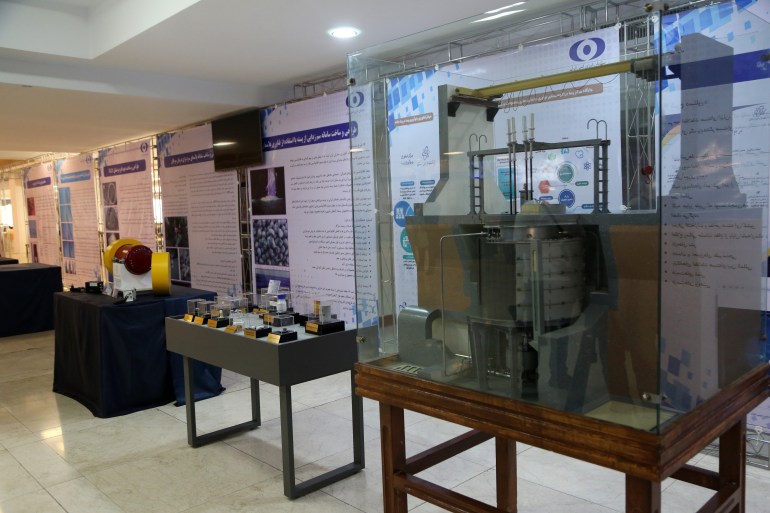Special -
After the Vienna nuclear negotiations in the first two months of this year were about to culminate in announcing the rescue of the nuclear agreement, they faltered last March as a result of Russian demands for written guarantees to continue their cooperation with Iran, which re-escalated the already hot file.
With the frequency of Western and Israeli talk about Iran getting close to acquiring a nuclear bomb during the past years, and the diminishing chances of returning to the nuclear agreement, the Western escalation against Iran intensified, as Tehran's repeated denials are no longer useful in persuading public opinion and dispelling its fears that it is not heading to build an atomic bomb.
In light of the return of the nuclear file to the fore again after the International Atomic Energy Agency's Board of Governors issued a resolution against Tehran, observers in Iran were divided over the possibility of their country becoming a nuclear power.
And the agency recently issued a report in which it considered that Tehran had not provided sufficient explanations about finding traces of nuclear materials at 3 previously unauthorized sites.
This was rejected by Iran and considered it a "political and non-constructive decision."
Nuclear bomb and strengthening of power sources
The director of the Arab Center for Iranian Studies, Muhammad Salih Sedqian, believes that the political circles in Iran have never agreed on dealing with Western countries regarding the nuclear file, explaining that contrary to what former President Hassan Rouhani believed about the need to resolve thorny issues at the regional and international levels, there is Who believes in Tehran the need to strengthen the sources of power.
Sedqian explained to Al Jazeera Net that the vision of the hard-line movement in Iran is based on the sources of strength in dealing with the West, and it rejects any concession in order to resolve the thorny issues with it, adding that the conservative movement believes that Western countries, led by the United States, do not accept anything less than dismantling Nuclear and missile programs to ensure the security of Israel.
The analyst stressed that Iran's conservative hawks are urging the need to employ the nuclear program as it is an influential factor in the "Iranian deterrence system", and this explains their desire to reach a nuclear weapon to ensure the country's security and fortify it against external threats.
This segment believes that reaching a nuclear bomb would establish the "equation of terror with the Israeli entity", according to Seddian, and that staying in the nuclear agreement and the Nuclear Non-Proliferation Treaty does not guarantee national interests.
In light of the continuous Israeli threats to Tehran, the director of the Arab Center for Iranian Studies concluded that "the security of the Israeli entity is the core of the conflict between Tehran and Washington, and the opposition of the occupation leaders to the negotiations aimed at saving the nuclear agreement reveals the main reason behind its failure in Vienna."
He said that the continued escalation against Iran may push the hard-line movement in it to work towards converting to a nuclear capability, and this matter was not taken into account at the present time.
An exhibition of nuclear industries in Tehran (Anatolia)
Technical capability of nuclear armament
And whether Tehran is capable of producing a nuclear bomb, the response was frank in the affirmative, according to Mohsen Jaliund, a professor of political science at the University of Tehran and a researcher in the Iranian nuclear file.
The researcher and academic believes that the Iranian stockpile of highly enriched uranium qualifies Tehran to develop a nuclear bomb, by raising the enrichment rate from 60% to 90%.
According to the latest quarterly report issued by the International Atomic Energy Agency, Tehran's stockpile of 60% enriched uranium exceeded 43 kilograms, while 42 kilograms of 90% enriched uranium is sufficient to produce an atomic bomb, Jilund says.
The Iranian researcher stressed the possibility of raising the percentage of enriched uranium from 60% to 90% through the available energies in Iran.
Mahdi Azizi says that the consequences of acquiring a nuclear bomb will be very costly for Tehran (Al-Jazeera)
Obstacles to making nuclear weapons
On the other hand, a segment of Iranians exclude the possibility of their country possessing a nuclear bomb, stressing that in addition to the fatwa of the reference prohibiting the production of weapons of mass destruction, possession of a nuclear bomb poses a direct threat to national security and may lead to a nuclear arms race with unimaginable consequences.
In this context, Mahdi Azizi, political researcher and director general of the Nekah No news agency, believes that "no word is superior to the fatwa of Iranian Supreme Leader Ali Khamenei, which forbids the manufacture of a nuclear bomb," stressing that the repercussions of acquiring a nuclear bomb are extremely costly to Tehran and do not secure its interests. The strategy.
In his speech to Al-Jazeera Net, Azizi compared the regional security situation to a "powder keg about to explode," adding that after the international inability to confront the "Zionist entity" that possesses dozens of nuclear warheads, he said, Tehran's transformation into a nuclear power would lead to A nuclear arms race in the region, and this is what Tehran does not want.
He added that "weapons of mass destruction have no place in Iran's military doctrine," accusing Washington and Tel Aviv of working to fabricate propaganda about Tehran's approach to building nuclear weapons, in order to get it to make concessions in the negotiations to save the nuclear agreement.
Azizi concluded that reviving the nuclear agreement is capable of removing the specter of escalation from the region, especially if US sanctions against Iran are lifted and constructive interaction between Tehran and the International Atomic Energy Agency resumes.

